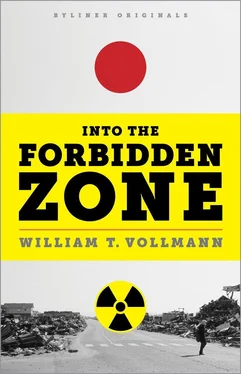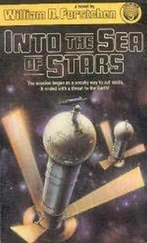NONE OF US ARE PARTICULARLY CONCERNED
THREE BLOCKS AWAY from the pedestrian mall where on this sunny, breezy afternoon members of the group called Atiatom proffered petitions against nuclear weapons and reactors, in an almost undamaged quarter stood the Sendai City War Reconstruction Memorial Hall, which presently served as a temporary evacuation center for thirty-one voluntary evacuees from Fukushima. One entered through the back door, the earthquake having rendered the lobby’s ceiling ducts liable to collapse. In Japan, neighborhood attachments run deep enough that communities often relocate as coherent entities. Hence the Memorial Hall housed people from a specific place: the northern sector of the radiation-poisoned zone.
Rather than seek out some bureaucrat who might have denied me entry privileges (I had already been refused permission to sleep in several evacuation shelters), I waylaid the first nonuniformed individual who seemed in no hurry — in this case, a bespectacled woman about twenty-five years old who had fled the Haramachi-ku ward of Minami Soma City. Officialdom had drawn two rings around Plant Number One. The inner one, twenty kilometers in diameter, constituted an area of involuntary evacuation. Residents of the outer ring were merely advised to leave, at their own expense; if they wished, they could remain home, keeping indoors as much as practicable. The woman, whose name was Hotsuki Minako, had lived in the outer ring.
She said: “On Friday there was an earthquake. On Sunday or Monday, on the news they said to stay inside. We tried to wait and see, but since we have kids, just my two kids and I came to Sendai with my husband. In a couple of days, my husband’s parents also came here.”
“So now your home is empty?”
“Yes.”
“Could you please tell me more about how you left Minami Soma?”
“After we saw the video of the reactor explosion, we immediately moved. Even after the explosion we thought we could come back. .”
“Did you feel or hear the explosion?”
“No. We only saw the television image. There were three explosions, I think”—she held her fist to her mouth in thought. “And because we had kids, we were concerned. Otherwise we would have simply stayed inside.”
“If somebody cared for your children where it was safe, would you ever go back?”
“Life here is just fine, so we are not too concerned to go back.”
She had a very oval, girlish face; her bangs spilled over her thick eyebrows. Her hooded blue sweatshirt seemed too large for her.
Soon, she believed, her family and neighbors would be moved again, to a hotel, “so that the community itself will continue.” They had already stayed first at a relative’s, then at an elementary school. She supposed that after the hotel they would be moved still again.
“Do you think you’ll be returning home anytime soon?”
“I have a feeling it will take a year or more.”
“When you think about radiation, what comes into your mind?”
“I worked as a clerk for a Tepco subsidiary. So I’ve heard about the danger of radiation and about controlling it, but I hear it’s not that scary. But now, when I hear on television that it can affect your blood and so forth, well, I didn’t know that.”
“Was Tepco a good employer?”
“Those who worked at the nuclear site seemed to enjoy their job, but I only saw them once a month. I was in a clerical department.”
“How are you managing for expenses nowadays?”
“We are using our savings. I heard the city would pay some fifty thousand 20per household, but I was unable to attend the registration for that. The city office is not really functioning. I’ve lost my job, but I don’t know whether I can register for unemployment in this prefecture.”
“Should we ask for you at the prefectural office?”
“My company has not finished the clerical procedures related to our termination, so I cannot.”
She had two children, ages seven and five. Just now they were at the park with her husband. I asked how they were managing, and she replied: “They’ve regressed to a younger state. At home they do everything themselves. Here, I don’t know whether it’s from staying so long and living like this, they say, ‘I can’t do this. .’”
I requested to see how her family lived. She hesitated. “My husband’s mother is a bit depressed, so. .” At length I prevailed on her to at least ask the older woman, who kindly allowed the interpreter and me inside the long, almost empty room, over whose floor stretched many long, narrow tatami mats, very bright and clean, a few bags of belongings in a neat row against the wall. Sheets and blankets had been folded into neat squares and stacked.
Hotsuki Keiko, the mother-in-law, was lying down. She sat up when we came in, smiling politely, lowering her eyes, discreetly half-stretching; perhaps she had been sleeping. She appeared to be not much older than her daughter-in-law. Bowing as respectfully as I could, I inquired how the quake had expressed itself to her.
“At that time I was at home. I rushed out of the house, where there was a big plum tree. I held it for a long time.”
Since Minami Soma lies some distance from the ocean, the tsunami caused her no personal fear. But her aunt and uncle had drowned in their car. Fortunately, she said, the family could recover their bodies. Unfortunately, the cemetery had washed away.
“We were allowed within thirty kilometers. The recommendation was to stay inside. The city mayor told us to evacuate ‘on your responsibility,’ so some are still living there.”
“What is your opinion of the reactor accident?”
“Everyone has always said that nuclear power is safe. .”
“Mrs. Hotsuki, here is a question that baffles me. As a citizen of the country that dropped atomic bombs on Japan, I wonder how this could have happened in your country twice. First you were our victims, and then, it seems, you did it again to yourselves.”
“We don’t know much about the nuclear bomb,” explained the older woman. “They’re pretty far from here, Hiroshima and Nagasaki, and we just heard from our parents that some plane came over and so forth. They didn’t talk about it.”
“Why didn’t they?”
“Unless you go to that area and see that atomic site, then maybe you have no interest in it.” Trying to give me what I appeared to expect, Mrs. Hotsuki gleaned through her memories, then presently grew animated, gesturing and almost grimacing as if she were close to tears, nodding her head as she said: “Once I saw a display in Chiba Prefecture, all about the kamikazes. I was so moved I couldn’t stop crying.”
Less moved by the kamikazes than perhaps I should have been, I resurrected the matter of Hiroshima and Nagasaki. It turned out that both of the Hotsuki women believed the atomic bomb to have been worse than the reactor accident, because “at least we evacuated.” Minako, the young daughter-in-law, explained that “the prefectural office said that if you just brush it off, it should be okay, and you don’t even have to take the radiation screening. So we felt better.”
As Orwell would say, ignorance is strength. Or was the prefectural office correct? Alpha particles were nearly harmless, if one managed not to ingest them; beta particles once washed or brushed away could do no further harm. While I essayed to formulate why that procedure might be inadequate, a pretty girl wearing a red armband bowed herself in, announcing that the child-minders were here again, today with candy; she also wished to inquire whether anyone might be sick. So perhaps it was all perfect; no matter how politely I pleaded, neither of my two interviewees would accept a ten-thousand-yen note, not even for the children’s sake; wouldn’t you rather believe that they lacked for nothing?
Читать дальше












